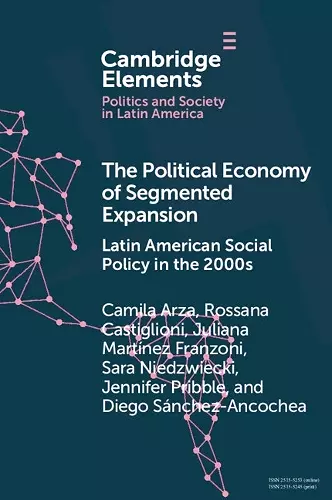The Political Economy of Segmented Expansion
Latin American Social Policy in the 2000s
Sara Niedzwiecki author Juliana Martínez Franzoni author Diego Sánchez-Ancochea author Camila Arza author Rossana Castiglioni author Jennifer Pribble author
Format:Paperback
Publisher:Cambridge University Press
Published:8th Dec '22
Currently unavailable, and unfortunately no date known when it will be back

Latin America's social policy expansion of the early 2000s was significant yet segmented.
This Element shows that Latin America's social policy gains in the early 2000s remained segmented, exhibiting differences in access and benefit levels, gaps in service quality, and unevenness across policy sectors. It argues that this segmented expansion resulted due to the characteristics of democracy, economic conditions, and policy legacies.The early 2000s were a period of social policy expansion in Latin America. New programs were created in healthcare, pensions, and social assistance, and previously excluded groups were incorporated into existing policies. What was the character of this social policy expansion? Why did the region experience this transformation? Drawing on a large body of research, this Element shows that the social policy gains in the early 2000s remained segmented, exhibiting differences in access and benefit levels, gaps in service quality, and unevenness across policy sectors. It argues that this segmented expansion resulted from a combination of short and long-term characteristics of democracy, favorable economic conditions, and policy legacies. The analysis reveals that scholars of Latin American social policy have generated important new concepts and theories that advance our understanding of perennial questions of welfare state development and change.
ISBN: 9781009344111
Dimensions: 228mm x 152mm x 5mm
Weight: 140g
88 pages